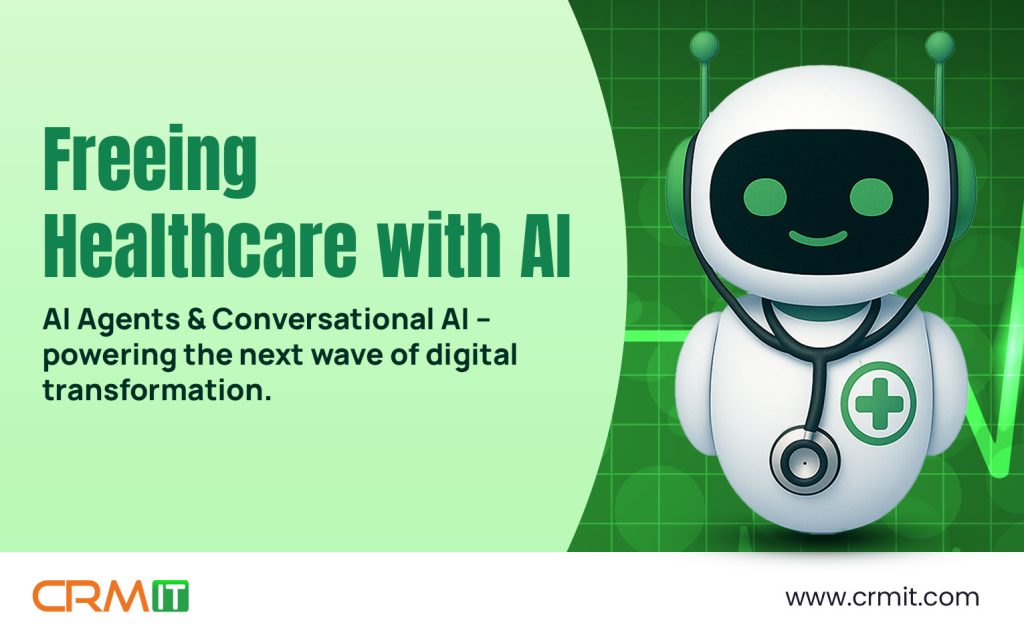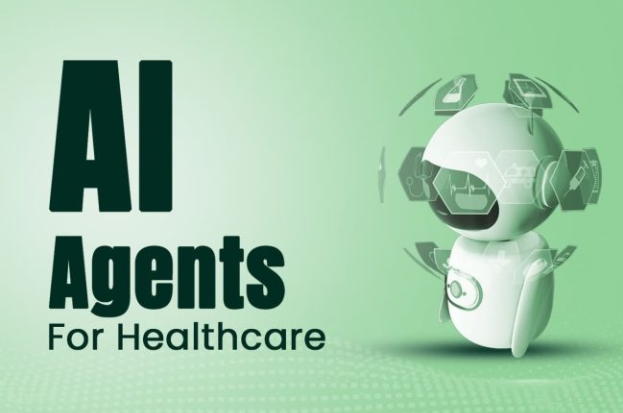Freeing Healthcare through the Employment of AI: The AI Agents for Healthcare and Conversational AI Future in Digital Transformation

Digital transformation is also affecting the health care industry. With higher demands for higher quality patient care, operations, and outcomes more and more on the rise, health care practitioners are seeking alternative ways of reconstructing their practice. Two of them are Artificial Intelligence (AI) and, more significantly, AI agents for healthcare and conversational AI. They are revolutionizing patient and health care provider interactions, task fulfillment, and choice-making.
In this blog, we will explain in detail how chatbots and AI agents not only improve patient care but also aid in digital transformation in healthcare units.
The Role of AI Agents in Healthcare

Machine learning and high-end algorithm-powers AI agents are created to rationalize day-to-day operations, bring real-time intelligence into effect, and support health infrastructure. Depending on their classification as virtual assistants, activities performed by the agents include scheduling appointments and responding to patient inquiries up to analysis and decision-making.
1. Rationalizing Operations
Most importantly, maybe the biggest advantage of AI agents is that they are able to automate operational and administrative tasks. For instance, automated systems are capable of assisting healthcare professionals with appointment scheduling in order to allow the members of staff to utilize their time for more useful patient-centered activities. In addition to maximizing the efficiency of operations, it also reduces human errors so that patients have fewer complicated interactions with enhanced resource distribution.
The AI agents can be used in big medical data analysis, useful information extraction from patient history, and aiding diagnosis and treatment planning. Physicians’ time can be saved to some extent from data entry and analysis via AI, and clinicians can have more time invested in actual patient care.
2. Enabling Decision-Making
Healthcare is never an off-the-rack affair with all these factors to enter into the picture and impact outcomes for patients. AI agents can review enormous amounts of data—patient history, medical literature, treatment effectiveness—and provide clinicians evidence-based suggestions. This creates the possibility of AI-first decision-making, where clinicians can make more accurate decisions in a quicker amount of time.
Second, AI agents facilitate data-to-decision by converting clinical information into actionable formats. This is critically vital in dynamic settings where timely movement within decision spaces is highly critical. For instance, AI can forecast patient decline from surveillance data in real-time such that clinicians can intervene early and enhance patient outcomes.
3. Enhanced Accuracy in Diagnostics
Artificial intelligence agents can also be utilized to achieve high accuracy diagnosis. Machine learning processes can scan medical images, identify patterns in large populations of patients’ history, and even more refined diagnoses than can be discerned by the human eye. For example, AI software can scan X-rays or MRIs for pre-emptive signs of illness such as cancer.
In cardiology, oncology, and neurology, AI diagnosis can rule out human error and make sure the most up-to-date and accurate therapy on hand is being given to the patients.
The Power of Conversational AI in Healthcare
Another essential health digitalization sector is conversational AI, a machine learning platform with NLP that can create and understand human language. With patient care conversational AI, healthcare providers will be able to increase engagement and elicit more levels of participation while still getting things done.
1. Building Patient Engagement
Patient engagement is the one responsible for improved health outcomes. AI conversation assistants can improve patient engagement with 24/7 availability of medical information, answering patients’ questions, and assisting patients with treatment adherence. From making a patient understand medicine to reminding a patient about time for appointment, conversational AI offers an easy interface to communicate with healthcare providers.
Second, artificial intelligence chatbots can control chronic disease by tracking symptoms, providing lifestyle advice, and alerting healthcare professionals if treatment is necessary. This offers constant care and keeps patients engaged in their sickness between doctor visits.
2. Reducing Administrative Burden
All this bureaucratic work like addressing patient questions, scheduling appointments, and cross-checking insurance information consumes enormous amounts of time and labor. This can be reduced by conversational AI through patient communication in the form of chatbots, voice assistants, or even messaging text platforms. Healthcare organizations save their resources and rationalize their operations by employing AI to automate routine repetitive bureaucratic work.
Second, artificial intelligence agents can be introduced into current systems like Electronic Health Records (EHRs) and practice management so that patient interactions are recorded and available to the healthcare provider. Integration avoids errors and enhances the overall quality of care.
3. Enhancing Telemedicine and Virtual Care
Telemedicine and telecare have added a problem for the healthcare professionals to keep the patients involved and provide good care without physically being present. Converse AI is well-suited in this line of work, where the professionals can interact with the patients by means of virtual consultation, messages, and voice commands. Pre-screening, symptom checking, and follow-up can be done via AI agents, which also renders telemedicine service more efficient and convenient.
For instance, prior to a telemedicine consultation, a patient chat AI assistant can gather patient data such as symptoms, history, and lifestyle and provide feedback to the clinician. This maximizes time usage during consults so clinicians have less time allocated to documentation and more time for patient care.
AI and Digital Transformation in Healthcare
The connection between conversational AI and AI agents is not just increasing patient care or business efficiency. It’s a digital transformation facilitator in healthcare. Digital transformation is the implementation of digital technology to enhance service, optimal workflow to boost those services, and data-based decision making to boost those businesses. In healthcare, it’s already happening, and one of the pioneers is AI.
1. Data Interoperability and Integration
Maybe the most significant challenge healthcare organizations face is interoperability and integration of multiple data systems. AI-based solutions can break this issue in some way by getting systems to collect information about individual patients from multiple sources—e.g., lab tests, wearables, and EHRs—into a single system. It is the development of a clearer picture of patient health, which is further used to arrive at more accurate diagnoses, more personalized treatment, and more enhanced overall care.
All of this conversational AI technology is opening giant gates to data availability and utilization for the whole health care team. From offering a snapshot of a patient’s clinical background to offering real-time commentary on life-or-death care in the ICU, all these AI solutions are offering the proper information to the appropriate individual at the correct time.
2. Transforming to a Patient-Centered Model
Accelerating digital innovation is the transition from provider-focused to patient-focused care. The AI technology facilitates this by engaging more with patients, enhancing communication, and rendering treatment more individually customized. AI agents can track a patient’s path, predict future healthcare requirements, and render care more individually customized. This allows healthcare organizations to transition from off-the-shelf to a dynamic, individually customized approach to care.
3. Enhancing Operative Efficiency and Cost Savings
The healthcare centers are made effective and responsive through AI solution-based systems. AI agents lower the operation cost by automating administrative tasks, enhancing decision-making capacity, and enhancing diagnosis capacity, thereby having less work to do for healthcare providers. As healthcare providers look in every direction for how to maximize their bottom line without lowering the quality of care, AI will continue to remain the first solution to making this possible.
Conclusion
Since the healthcare sector continues to expand and evolve, chatbots and AI agents for healthcare are increasingly playing a central role in digital transformation strategies for the healthcare sector. With decreased process complexity, higher patient engagement, and better decision-making, such products are enabling health providers to provide improved care faster and more efficiently.
The future of medicine is highly AI-first, and conversational AI and AI agents are leading the charge. As they keep evolving, they will be at the forefront of the future of medicine, where decision-making and data go hand-in-hand to produce patient outcomes and operating performance.
Blending AI and medicine is not a matter of riding the tech wave; it’s about opening medicine to more patients, more accurately and more efficiently for the doctors and patients.